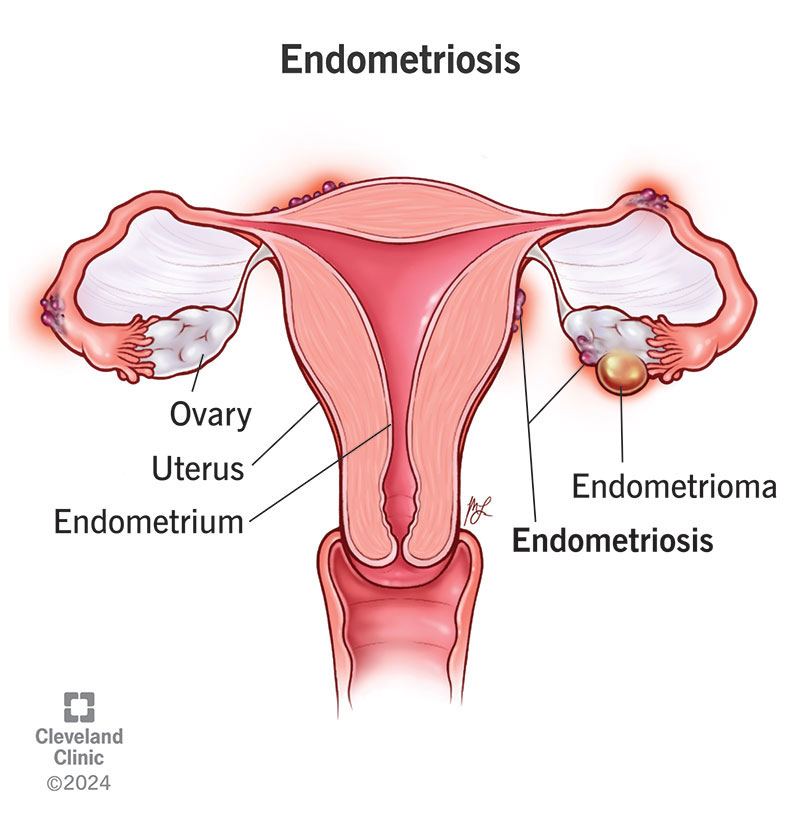Are you experiencing bloating and discomfort that seems to come out of nowhere? Suddenly looking five months pregnant…when you’re definitely not? You might be dealing with a condition commonly known as endo belly. In this article, we’ll dive deep into understanding endo belly, including its causes, symptoms, and natural remedies.
Endo belly refers to the bloating that many individuals with endometriosis experience. It’s often characterized by a distended abdomen that can be painful and make you feel self-conscious. But what causes this condition? And how can you find relief?
We will explore the various factors that contribute to this bloating, such as inflammation and hormonal imbalances. Additionally, we’ll discuss the common symptoms to look out for, including pelvic pain, gastrointestinal issues, and fatigue.
But worry not – there are holistic solutions that can help alleviate your symptoms! We’ll take a look at dietary changes, herbal remedies, and stress management techniques as ways to find relief and improve your overall well-being.
So, if you’re ready to understand, manage, and end endo belly once and for all, let’s get started!
What is endo belly?
The term “endo belly” refers to the bloating and distension of the abdomen that many endometriosis patients experience. This swelling can occur at any time, regardless of the menstrual cycle, and can vary in severity from person to person. Endo belly is often described as a sudden and unexplained increase in abdominal girth, accompanied by discomfort, pain, and a feeling of fullness.
It’s important to understand that this isn’t just a cosmetic issue; it is a real and often debilitating symptom of endometriosis. The bloating and distension can be physically and emotionally challenging, as it can impact your self-confidence, clothing choices, and ability to participate in daily activities.
Recognizing and addressing endo belly is a crucial step in managing the overall symptoms of endometriosis!
Causes of endo belly

One of the primary causes is the presence of endometrial-like tissue outside the uterus. This tissue, similar to the lining of the uterus, responds to hormonal changes throughout the menstrual cycle. When this tissue implants on organs outside the uterus, it can cause inflammation, scarring, and adhesions, leading in part to the characteristic bloating and distension associated with endo belly.
Additionally, endometriosis can also affect the digestive system, causing issues such as constipation, diarrhea, and irritable bowel syndrome (IBS). These gastrointestinal symptoms can further contribute to the development of endo belly. This is a two-way street! Endometriosis can affect the digestive system, but your GI health can also impact endometriosis! Learn more about how gut health affects endometriosis here.
The inflammation and irritation of the digestive tract can lead to bloating, gas, and a feeling of fullness, even when you have not consumed a large meal. Frustrating, right?
Hormonal imbalances are another factor that can exacerbate endo belly. Endometriosis is often accompanied by fluctuations in estrogen, progesterone, and other reproductive hormones, which can contribute to fluid retention and inflammation in the abdominal area. These hormonal changes can also affect the digestive system, leading to additional bloating and discomfort.
Symptoms of endo belly
The primary symptom is a noticeable and sudden increase in abdominal size or girth. This bloating can occur at any time, regardless of your menstrual cycle, and can be accompanied by a range of other symptoms.
Some of the common symptoms associated with endo belly include:
- Abdominal pain or discomfort
- Pelvic pain
- Constipation or diarrhea
- Nausea or vomiting
- Fatigue
- Difficulty wearing certain clothing
- Feeling self-conscious or uncomfortable in social situations
The severity of these symptoms can vary greatly from person to person, and they may also fluctuate throughout the menstrual cycle or in response to certain triggers, such as specific foods or stress. It’s important to note that the degree of bloating and discomfort does not necessarily correlate with the severity of the underlying endometriosis.
Endo belly can be particularly challenging to manage, as the bloating and distension can come and go without a clear pattern or trigger. This unpredictability can be frustrating and can impact your quality of life, both physically and emotionally.
The impact of endo belly on daily life

Impacts on daily life can be significant and far-reaching. The sudden and unexplained bloating can lead to physical discomfort, pain, and a feeling of self-consciousness, which can affect your ability to participate in various activities.
One of the most common challenges faced by individuals with endo belly is the difficulty in finding clothing that fits comfortably. The bloating can cause a significant change in abdominal size, making it challenging to wear certain styles or sizes of clothing. This can lead to feelings of frustration, anxiety, and a lack of confidence, especially in social situations.
It can also impact your ability to engage in physical activities and exercise. The abdominal discomfort and pain can make it difficult to participate in certain exercises or activities, further limiting your mobility and overall well-being.
This can have a cascading effect on mental health, as the inability to maintain an active lifestyle can contribute to feelings of depression, anxiety, and low self-esteem.
Moreover, the unpredictable nature of endo belly can make it challenging to plan and participate in social events or activities. The fear of unexpected bloating or discomfort can lead to individuals avoiding social situations, which can further isolate you and impact your overall quality of life.
Diagnosing endo belly
Diagnosing endo belly can be a complex process, as it is often a symptom of the underlying condition of endometriosis. The first step in the diagnostic process is typically a thorough medical history and physical examination by a healthcare provider.
During the physical examination, the healthcare provider will likely palpate the abdomen to assess for any abnormalities, such as tenderness, masses, or distension. They may also perform a pelvic exam to check for any signs of endometriosis, such as scarring or adhesions.
In addition to the physical examination, healthcare providers may order various diagnostic tests to help confirm the presence of endometriosis and rule out other potential causes of the bloating and abdominal discomfort. These tests may include:
- Imaging tests, such as transvaginal ultrasound, MRI, or CT scan, to visualize the pelvic organs and identify any endometrial implants or adhesions.
- Laparoscopy, a minimally invasive surgical procedure that allows the healthcare provider to directly visualize and diagnose endometriosis.
- Blood tests, such as CA-125, to measure the levels of certain biomarkers that may be elevated in individuals with endometriosis.
It’s important to note that the diagnosis of endometriosis and endo belly can be challenging, as the symptoms can vary greatly from person to person and may mimic other conditions. Healthcare providers may need to perform multiple tests and evaluations to arrive at a definitive diagnosis.
Managing endo belly through diet and lifestyle changes

Managing endo belly often requires a multifaceted approach, including dietary and lifestyle modifications. Making changes to your diet and daily routine can help alleviate the symptoms and improve your overall well-being.
One of the primary dietary recommendations for individuals with endo belly is to adopt an anti-inflammatory diet. This type of diet focuses on consuming foods that can help reduce inflammation in the body, which is a key driver of endometriosis-related symptoms. Some key components of an anti-inflammatory diet for endo belly include:
- Increasing the intake of fruits and vegetables, which are rich in antioxidants and anti-inflammatory compounds.
- Incorporating omega-3 fatty acids, found in foods like fatty fish, walnuts, and flaxseeds, to help reduce inflammation.
- Limiting or avoiding pro-inflammatory foods, such as processed foods, refined carbohydrates and sugar, and for many people triggering foods like gluten and dairy.
- Staying hydrated by drinking plenty of water throughout the day.
In addition to dietary changes, there are various lifestyle modifications that can help manage endo belly. These include:
- Engaging in gentle, low-impact exercise, such as walking, yoga, or swimming, to help reduce bloating and improve overall physical and mental well-being.
- Practicing stress management techniques, such as meditation, deep breathing, or guided imagery, to help alleviate the impact of stress on the body.
- Ensuring adequate sleep and rest, as sleep deprivation can exacerbate inflammation and worsen endo belly symptoms.
- Identifying and avoiding potential triggers, such as certain foods or activities, that may worsen the bloating and discomfort.
By implementing a combination of dietary and lifestyle changes, you can work towards managing your symptoms and improving your overall quality of life.
Holistic solutions
In addition to dietary and lifestyle modifications, there are several natural remedies that may provide relief for individuals experiencing endo belly.
One of the most commonly recommended natural remedies for endo belly is the use of herbal supplements. Certain herbs, such as turmeric, ginger, and chamomile, have anti-inflammatory properties that may help reduce the swelling and discomfort associated with endo belly. These herbs can be consumed in various forms, such as teas, tinctures, or capsules.

Improving overall gut health by supporting digestion and microbial balance in your gut can be a huge benefit to endo warriors as well.
Additionally, some individuals have found relief through the use of castor oil packs applied to the abdomen. This can help improve circulation and reduce inflammation in the affected areas.
Be sure to check with your medical provider before making any changes!
Exercise and endo belly

Engaging in regular physical activity can play a significant role in managing the symptoms of endo belly. While the abdominal discomfort and bloating may make exercise challenging, incorporating gentle, low-impact activities can be beneficial.
One of the key benefits of exercise is its ability to reduce inflammation in the body. Physical activity can help increase blood flow, improve circulation, and stimulate the release of endorphins, which are the body’s natural pain-relieving compounds. This, in turn, can help alleviate the abdominal discomfort and bloating.
Additionally, exercise can help improve overall digestive function, which can be particularly important for endometriosis-related gastrointestinal issues. Activities that promote bowel regularity, such as walking or gentle yoga, may help reduce the bloating.
When it comes to choosing the right exercise, the focus should be on low-impact, gentle activities that do not exacerbate the symptoms, like Amy Grace and I spoke about in our interview. Some recommended exercises include:
- Walking: A simple and accessible form of exercise that can help improve circulation and reduce inflammation.
- Yoga: Gentle yoga poses and sequences that focus on the abdominal area can help alleviate endo belly symptoms.
- Swimming: A low-impact activity that can improve circulation and reduce the strain on the abdominal muscles.
- Pilates: Pilates exercises can help strengthen the core muscles and improve overall body awareness, which may benefit individuals with endo belly.
It’s important to listen to your body and start slowly, gradually increasing the duration and intensity of your exercise routine.
Support and resources
Navigating the challenges of endo belly can be a daunting and isolating experience. However, there are various support resources and communities available to help you manage your condition and find relief.
One of the most valuable resources for individuals with endo belly is connecting with support groups, either in-person or online. These groups provide a safe and empathetic space for individuals to share their experiences, seek advice, and find solidarity with others who understand the unique challenges of living with endometriosis and endo belly.
You may also benefit from seeking guidance from healthcare and holistic professionals who specialize in endometriosis and pelvic health. This may include endometriosis excision specialists, functional medicine or functional nutrition providers, acupuncturists, pelvic floor therapists, and more.
Furthermore, there are various educational resources and informational materials available to help you better understand your condition and explore effective management strategies. Reputable organizations, such as the Endometriosis Foundation of America and the World Endometriosis Society, provide comprehensive information, research updates, and patient resources on their websites.
By accessing these support systems and resources, you can empower yourself, connect with a community of understanding peers, and develop a comprehensive plan to manage your symptoms and improve your overall quality of life.
Conclusion and final thoughts
Endo belly is a complex and often debilitating symptom of endometriosis that can have a significant impact on your daily life. Understanding the causes, symptoms, and available management strategies is crucial when living with this condition.
Through a combination of dietary and lifestyle modifications, natural remedies, and targeted exercise, you can work towards finding relief. It’s important to remember that the management of endo belly is a highly personalized journey, and what works for one individual may not work for another.
By seeking support from healthcare professionals, connecting with understanding communities, and advocating for your own needs, you can take control of your condition! With the right resources and strategies, it is possible to manage the symptoms of endo belly and live a fulfilling life.
Remember, you are not alone in this journey. There are countless individuals and organizations dedicated to supporting and empowering those affected by endometriosis and endo belly. By embracing a holistic approach and being patient with the process, you can find the relief and comfort you deserve.
About the Author

Alyssa Chavez is an endo warrior turned functional nutritionist specializing in working with women with endometriosis. She is host of The Endo Belly Girl Podcast and also works with women 1:1 and in a group setting virtually.
Additional Resources:
-
Ep. 93: Tired? Here’s What to Eat About It
In Part 2 of our fatigue series, we’re diving into how to actually support your energy through food, based on what your labs are telling you. If you listened to last week’s episode and thought, “Okay, cool… but now what do I do with this?”—this is your answer. Whether your iron is low, your thyroid feels sluggish, […] -
Ep. 92: 5 Lab Markers That Explain Your Fatigue
You’re sleeping, eating clean, and taking your supplement, but the fatigue is still relentless. In this episode, I’m breaking down 5 common lab categories that could be the hidden key to your low energy — even if your doctor says everything looks “normal.” We’ll talk about the difference between conventional and functional lab ranges, […] -
Ep. 91: Endo or Gut Issues? Here’s the Difference
Are you tired of feeling bloated all the time and wondering whether it’s just “endo doing its thing” or something deeper with your gut? This episode is for you! Today, we’re looking into the real differences (and surprising overlaps) between endo and gut issues. If you’ve tried all the tips, but still struggle […]





